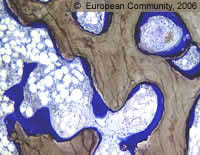Raising awareness of nano-bio-technology and its ethical issues
Any new technology brings both risks and benefits, and with them, public concern as well as demand. Scientists and policy-makers need to address public fears if they wish to keep supporting European research in such areas. The EU project NanoBio-Raise aims to help avoid the polarised debate surrounding genetic modification (GM) when it comes to the new applications made possible by the convergence of nano- and bio-technologies. Project coordinator Dr David Bennett, based in Delft, the Netherlands, emphasises that the two cases are quite different: 'nanotechnology is really a combination of distinct technologies and sciences; in this it is a very different field from GM'. Indeed, he says that nanotechnologies today, especially nanobiotechnologies, are 'nowhere near as advanced as GM was in the early 1990s'. Where 'nanotech', the science of the very small, meets 'biotech', based on new understanding of genetics, researchers are able to work with the fundamental building blocks of life itself. The techniques concerned, which include applications that sometimes also fall under the heading 'nanomedicine', have huge potential. They can range from 'labs-on-a-chip' that allow the kind of small-scale, high-throughput chemical analyses that would make sophisticated DNA tests affordable for all, to 'targeted devices' or 'non-viral vectors', which are tiny objects able to analyse or deliver treatment to specific human body cells. At the same time, as with any new technology with such assumed commercial potential, there is a lot of hype around the field, warns Dr Bennett. 'It is still not possible to say what will work, be realistic or be commercially viable,' he says. This is not the only cause for caution, since applications like affordable DNA tests or delivery of gene therapy to specific cells also raise ethical concerns and public fears. The idea of NanoBio-Raise is to identify such issues early, make recommendations on the limits to public acceptance and advise on how public concerns could be addressed. Fears of nanotechnology becoming out of control, the so called 'grey goo' scenario popularised by the novel 'Prey', when combined with reactions to new biotechnology such as gene therapy, would seem to be a potent mix, recognises Dr Bennett. He emphasises the need to learn the lessons of the GM debate and engage with all viewpoints, including environmental campaigners. A lack of public support will surely affect funding, potentially leading to Europe losing its scientific expertise in even the uncontroversial areas of this field, he warns. A panel on nanotechnology at the Communicating European Research conference in November 2005 contrasted the experience of negative public reactions against GMOs with the general acceptance of mobile phone technology despite suspicions of health risks; what could be perhaps be termed the 'GM story' versus the 'GSM story'. Speaking on the panel, Dr Bennett emphasised the importance of learning the lessons of the GM debate and that researchers should work closely with politicians, activists, the media and the public from very early on in a technology's development. The project has assembled a panel of the leading ethicists in this area, Dr Bennett explains, including Professor George Khushf of the University of South Carolina and Professor Sir Brian Heap of Cambridge University, UK. This steering group will then work with the project partners, from Belgium, Denmark, Germany, the Netherlands, Sweden and the UK, to guide the project's activities. These kick off with a 'horizon scanning' workshop involving ethicists, researchers, communications professionals and media. This will be followed by a series of public opinion focus groups to identify social and ethical issues. In these ways NanoBio-Raise will build on the public consultation already carried out by NanoForum. The project will also liaise with other EU projects carrying out scientific research in this field, such as Nano2Life, and those engaged in public consultation, such as NanoDialogue and Nanologue. Some of the project outputs should include briefing materials on ethical issues for researchers, MEPs and media, as well as training for scientists on communicating, involving and engaging with the public. The conclusions of the two-year project should influence scientists themselves, and help to inform research in this area under the next framework programme (FP7), as well as the European NanoMedicine technology platform and the EU's strategy and action plan for nanotechnology.



